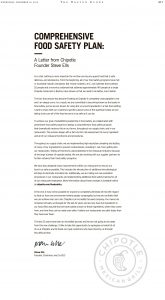I just registered for an Ice Hockey Australia Level 2 coaching course.
The course is rarely offered, and there’s only a couple of level 2 coaches in Queensland. It will take 25 hours of training to complete.
 That’s on top of the 16 hours I put in for Coach 1 in Australia, and recertification every two years.
That’s on top of the 16 hours I put in for Coach 1 in Australia, and recertification every two years.
It’s similar to the Intermediate Level Coach status I had in Canada back in 2001, which was required to coach a rep or travel team.
It’s a lot of time, sitting in a classroom, and on the ice.
I view it as my church, my community service.
So when Chipotle makes a big deal saying all of its managers will be trained in food safety the ServSafe way, I shrug, and ask, why weren’t they before?
How far was Chipotle’s head up its own moralistic ass that it paid more attention to food porn – like hormones and GE foods – than to food safety, the things that make people barf?
Great, you’re going to require training. Anyone ask if the training is any good? Third-party audits? Nice soundbite but they’re just a paycheck. Handwashing every thirty minutes? McDonald’s have been doing that for decades (you’d think Chipotle would have picked that up when they were partnered with McDonald’s, but no, there was food porn to peddle).
The Chipotle announcement reads like a moralistic lecture, and that no one had discovered food safety before.
A year after the outbreaks, Chipotle is now getting into standard PR – which it should have done months ago (Chipotle, your communication advisors absolutely suck). The full page ad, the video, the push for food safety.
Guacamole, for instance, now takes advantages of the cleansing properties of the lemon and lime juices in the recipe. Before getting mixed, the chopped tomatoes, onions and jalapeños are laid on top of avocados and drizzled with citrus juices in one last effort to ensure food safety.
Some scientists may question such tactics, saying they have been supplanted by newer methods. But Dr. James Marsden, Chipotle’s new executive director of food safety, who had recently retired from teaching at Kansas State University (and the father of the actor James Marsden, best known as Cyclops in the “X Men” film series) said he was confident in them.
“We’re doing research and are going to publish papers on what we’re doing, so people can see for themselves that it works,” he said.
That’s all good, but they’re still moralistic assholes who expect people to pay a premium for their food sermons (journos, contact me for Marsden stories).
In a video that the Mexican burrito chain unveiled on Wednesday, a contrite Ells admits that last year, the fast-casual restaurant chain “failed to live up to our own food safety standards, and in so doing, we let our customers down. At that time, I made a promise to all of our customers that we would elevate our food safety program.”
 Contrite is not the word I would use.
Contrite is not the word I would use.
Looking to revalue Chipotle’s share price is more accurate.
Chipotle initially blamed the Centers for Disease Control and Australian beef for its woes. Today, it blamed social media.
“No one has ever had this kind of a food safety crisis in the era of social media,” Mr. Ells said.
I could list hundreds, beginning with E. coli O157 in spinach in 2006, you arrogant poser.
“Jack In The Box,” — a burger chain where more than 700 people got sick in 1993 after eating E. coli contaminated meat — “never had to deal with Facebook and Twitter,” he said.
When I coach, I’m always telling kids, and adults, stop blaming the refs, go score a goal, stop whinging.
What is fresh? Australian beef in the U.S.?
Is this guy stealing from Trump’s playbook?
It’s slogans and hucksterism.
Which Americans seem to go for.
And Mr. Ells, since you seem content on lecturing Americans about food safety, while blaming others, here’s a history lesson.
In the Fall of 1994, Intel computer chips became scrutinized by the computer geeks, and then the public.
Intel had delayed responding to allegations, and Wall Street analysts at the time said it was the result of a corporate culture accustomed to handling technical issues rather than addressing customers’ hopes and fears.
On Monday, Nov. 12, 1994, the International Business Machines Corp. abruptly announced that its own researchers had determined that the Pentium flaw would lead to division errors much more frequently than Intel said. IBM said it was suspending shipments of personal computers containing the Pentium chip
Mr. Grove was stunned. The head of IBM’s PC division, Richard Thoman, had given no advance warning. A fax from Thoman arrived at Intel’s HQ on Monday morning after the IBM announcement, saying he had been unable to find Grove’s number during the weekend. Mr. Grove, whose number is listed, called directory assistance twice to ask for his own number to ensure he was listed.
After the IBM announcement, the number of calls to Santa Clara overwhelmed the capacity of AT&T’s West Coast long-distance telephone switching centres, blocking calls. Intel stock fell 6.5 per cent
Only then, Mr. Grove said, did he begin to realize that an engineer’s approach was inappropriate for a consumer problem.
Intel took out full-page ads, apologized, and did better.
That was in months, not a year.
Mr. Ells, you can claim you’re in uncharted territory, that no one has experienced the woes like you have, that fresh is a meaningful term.
But it’s just a repeat.
Customers may expect you to have the humility to admit such failings when driven by the hubris of your own beliefs.
But hey, anyone who can get Americans to believe that 1,000 calorie burritos are healthy can do anything you damn well please.
And customers will bow down.
Investors. I wouldn’t touch it. But I said that in 2007.
